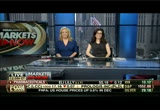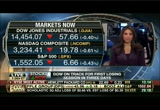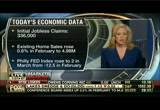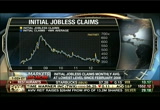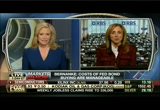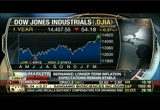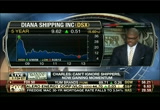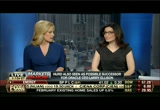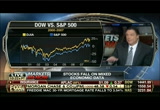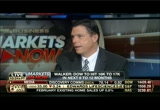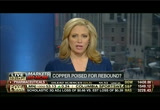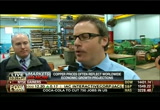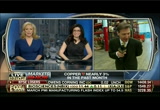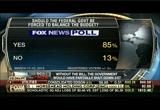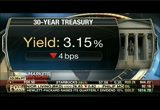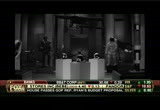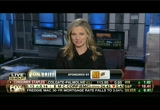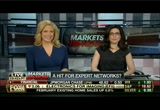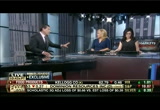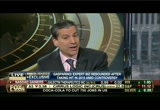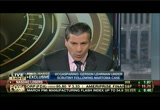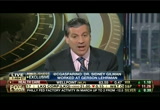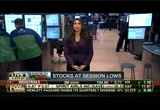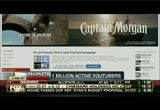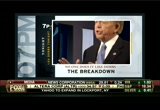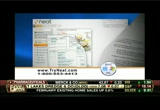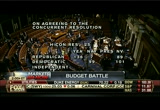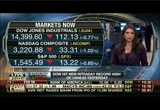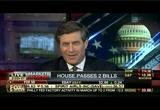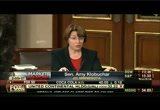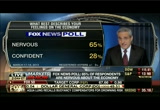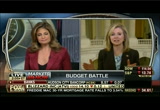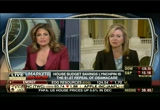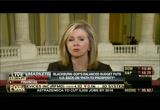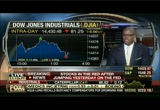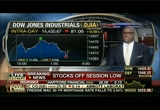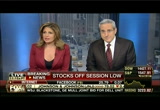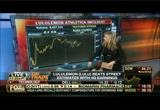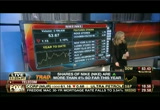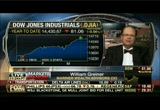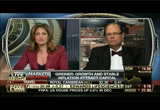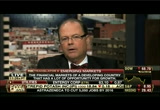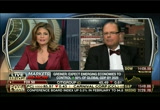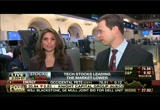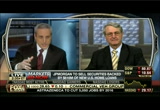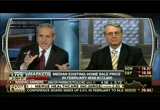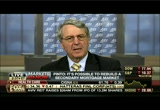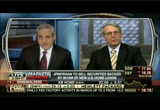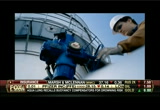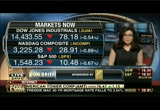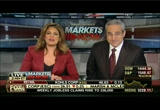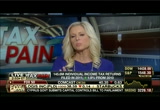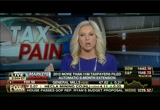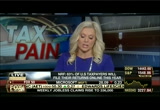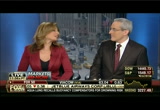tv Markets Now FOX Business March 21, 2013 1:00pm-3:00pm EDT
1:01 pm
1:02 pm
the next 6-12 months, wouldn't that be nice? how you should position your investments now. melissa: and strike a bailout deal or else, the european central bank threatening to cut awfully quiddity to cyprus by mundt if there is no deal. lori: what do you think lou dobbs will say? he'll join us on washington's stopgap effort to keep america's a government funded. stocks now, it's back down to the floor of the new york stock exchange and nicole petallides. stocks areeoff the lows of the today but still trending down. that's the sentiment day after the fed, isn't it? >> reporter: right, they are, indeed. we are seeing a stronger dollar, the vixx is to the upside, lori and melissa, and you're seeing a market that has had down arrows all day long. yesterday during the middle of the day we hit all-time record intraday highs on the dow jones industrials, today worries remain about europe, in particular mixed economic news here at home, but the eurozone
1:03 pm
pmi fell to a four month low. germany's manufacturing sector, well, that unexpectedly contracted, so you do have some pressure on the markets. that being said, we're down about 56 points sitting at 14,454. we do have some winners on the tow that are worth noting. take a look at coca-cola, unitedhealth care, walmart and chevron all posting gains, coca-cola up nearly one cent today. melissa: so some positive economic data out today, initial jobless claims coming in at a lower than expected 336,000 last week with the four week moving average at a more than five-year low. pretty good. existing home sales righting eight-tenths of a percent in february, the highest level since 2009. that index unexpectedly swinging into positive territory showing eastern manufacturing growth in february. so is all of this a sign the economy is improving? joining me now is michelle gerard, most fabulous u.s.
1:04 pm
economist for rbs. [laughter] how do you like that? did you know your title had been changed? >> i'm going to get my business cards reprinted. melissa: fabulous, why not? [laughter] talk to me about this data. did it make you feel good about the economy? is it a sign we're moving in the right direction? >> i tell you, you know, i -- it's hard for me to believe that the economy, um, is doing as well as it is. i mean, we've still got all the uncertainty about washington, and i think, you know, what's going on in cyprus is a reminder we shouldn't be so complacent about the eurozone, but the economy is really looking to be doing better than i, um, had even hoped that it would be. you mentioned the jobless claims numbers. i mean, there's something going on there. the trend there is nicely, has moved down nicely. it really kind of corroborates the strength we've seen in the employment numbers in the last couple of months. we know housing has been good, and there's many evidence of that. i mean, it's all coming together to show more resilience in this u.s. economy despite some of the
1:05 pm
ongoing headwinds it faced. melissa: do you think that jobless claims, i mean, is there any way to discount that data? is it possible people are discouraged, their not, you know -- they're not, you know, participating? is there anything we can say about it? >> yeah. not those claims numbers so much. people filing for unemployment benefits, you know, is what's tracked there. so, actually, what some people point to is, okay, well, it's great some companies aren't laying off workers, so you don't have additional people filing for unemployment benefits but, hey, it doesn't necessarily mean they're hiring, exactly. but the whole picture is coming together. i mean, yesterday in the press conference the fed chairman said, you know, the fed is going to look at all sorts of labor market indicators, and one of the things he talked about was the claims numbers which historically has, actually, always been a great indicator of employment and the overall economy. and i tell you, the move that we've seen, this down trend in recent weeks, i mean, just looking even past the last couple of weeks, this down trend
1:06 pm
that's emerged, i think, is notable. and i think it kind of corroborates the other strength we've seen in the labor market numbers. and i do think it suggests that, you know, maybe, in fact, the trend for payroll growth is 200,000. melissa: well, i'm glald you brought up the fed because at some point good economic news is going to be bad news because it's going to mean the fed is going to take away the punch bowl. there were a lot of questions about that yesterday. is there a way for the fed to exit and to unwind this massive balance sheet that doesn't roil the markets altogether? um, you know, ben bernanke said, and other people supported him, that he basically has control of the market because they are the biggest gorilla out there, so he can exit and, you know, manage rates on the way out. do you buy that? >> i don't think it's going to be as smooth as the fed hopes or thinks that it will be. of course, you know, we're probably years away from the fed actually raising interest rates. but as you said, the first step
1:07 pm
is just to take away the support of these asset purchases. boy, i mean, remember when the minutes for from the meetings sd that there were people who thought it would, the program would stop earlier and how that roiled the markets. i think that was an early glimpse of the fact it's not going to be easy when it comes time to scale back if the data are stronger. i mean, it's going to be something the market has to contend with, and i do think that it's going to be, it's going to be a volatile period as the market resets to more fundamental levels. melissa: you have people out there saying, you know, when the party is going to end, it's going to be ugly. you have real serious investors, you know, sort of scaring us. do you think when the fed says even they're going to tame their asset purchases and not do this 85 number that that, that would be enough to sort of roil markets? >> i do. i think that that is going to be something, um, that will end up pushing, putting upward pressure on rates. yesterday it was interesting in the press conference, you know, they never used the word taper which is kind of the suggestion
1:08 pm
that, okay, we slow the purchase and then we stop. he was very careful about using that he was going to adjust the pace of purchases, so if things looked better, they could scale backment but then if things got worse, they could always increase the size of purchases again, and i think that's how doesn't mean this is the beginning of the end, but i still think the markets will assume that, and i think we'll get a taste of just how difficult the exit ultimately will be for the fed. melissa: the always-fabulous michelle gerard, thanks for coming on. [laughter] >> see you soon, bye-bye. lori: all right. it's been a wild day in the commodities market especially for natural gas. phil flynn of price futures group is in the pits of the cme. phil, natural gas hitting $4 earlier, something we haven't seen since 2011, right? >> oh, yes. i was so much younger then. i remember it well. [laughter] pretty k350eu9ing stuff today. and i'll tell you what, if you look at natural gas today, we have pulled back just a little bit, but not as much as you
1:09 pm
might think. you know, despite the fact that we sell 62 btfs, we were looking for a drawdown of 70 billion feet, if you look at the big picture, things are tightening dramatically on the supply side. supplies of natural gas are now about 21% below where they were a year ago, and for the first time in, like, a year and a half the five-year average we're below double digits. we fell below 10 percent. so that's huge. what does that mean for oil? not a heck of a lot. oil's focused on concerns about europe, are they slowing down, are they going to get a deal in that part of the world? and right now it's actually taken a toll on oil. we have fallen pretty dramatically, and it seems like we're accelerating down near the lows of the day 92.5ed, so europe is weighing on oil. lori: quick question for you just crossed my desk here on the sugar trade. senators file a budget amendment to cut funding for usda sugar purchases. can you give me background on
1:10 pm
that? >> yes, absolutely. that has been a huge issue as of late because, of course, a lot of the farmers right now have been wanting to keep those in place, but it's been keeping the now. so when you look at this late-breaking story, there's more pressure to take away those subsidies which a lot of people say are keeping this out of line with the global market. lori: yeah. the usda's looking at buying 400,000 tons of sugar. melissa: the european central bank is ramping up pressure oo cyprus to secure bailout deal by monday. if there is no deal, then the ecb has threatened to pull emergency funding for the country's troubled banks which are still closed, by the way. they are scheduled to reopen on tuesday. quoting sources, dow jones is now reporting that the country will propose breaking up the banks, splitting good and bad assets. sounds familiar.
1:11 pm
the news out of cyprus dragging down european markets, the footsie there closing at a two week low. lori: i think this has got some legs. it's not done -- melissa: people discounting it. lori: yeah, for sure. melissa: one major reason stocks still struggling is oracle. a look at the quarterly earnings miss and what the company is blaming, that is ahead. lori: plus, lou dobbs at our government's band-aid approach. melissa: the dow's down about 50 points, but gold is up a third of a percentage point. silver is the winner, obviously, on a percentage basis there, one and a third percent. copper lower. we'll be right back.
1:13 pm
you ready? we wanna be our brother's keeper. what's number two we wanna do? bring it up to 90 decatherms. how bout ya, joe? let's go ahead and bring it online. attention on site, attention on site. now starting unit nine. some of the world's cleanest gas turbines are now powering some of america's biggest cities. siemens. answers.
1:14 pm
1:15 pm
to be kidding me. revenues were down, expenses were up. i looked at every single news release -- melissa: look at that pop. >> the pop is phenomenal, but this stock has been so many higher. when they catch on fire, they really catch on fire. the one turn i'm picking up looking at every single news release for the year is that their rates are going up dramatically. give you an example, the cape size which is i think the cape, the horn in africa, that right now, the last time they rented one of those out to cargill, 14,000 a day at the beginning of the year it was $10,000 a day. melissa: wow. >> the last time they rented out to glenn corps, 10,900 a day, at the beginning of the year, 7,200 a day. the last time they represented one out, $9,000 a day, the first time this year was at 6, 500. melissa: so it's not seasonal? i don't know a lot about shipping, do you think it's real strength in the economy? is it supply? >> it's got to be some sort of global strength. and the last thing today with
1:16 pm
cheryl i talked about enfamil and the fact that the top markets were things we never talk about, you know, china, mexico -- lori: as in the baby formulasome. >> yeah. but what's driving it is peru. the real global story beyond cyprus and germany and whatever. lori: what was interesting, the fedex earnings saw a huge decline in air. people are putting the emphasis on the ground shipping. i know we're talking about anything shipping. >> right. lori: but i wonder be that's because of the higher cost people are defaulting to sea and ground shipping? >> i'm not sure. lori: a connection there. >> i'm not sure. these things are huge, you know? something off of $14,000 a day -- melissa: yeah, that's got to be enormous. >> the panama is panama, the cape is south africa. what is that named for? lori: camsar? >> the largest report in the republic of beginny. this is truly a global -- melissa: i knew that. i just didn't want to make lori feel bad. i know, i'm so gracious.
1:17 pm
>> it makes a major breakout, trending huge volume. i haven't recommended it yet to my subscribers, but i'm close to doing it. lori: you can't buy that space on amazon. >> there you go. lori: thanks, charles. melissa: stocks of orr call slammed after disappointing software revenue which it blames on poor sales execution. and if that wasn't enough, new information has surfaced the blackstone group is trying to recruit oracle president mark hurd for the ceo position at dell as part of its bid for the computer manufacturer. hurd is the former ceo of dell rival hewlett-packard. he joined oracle in 2011 e and is speculated to be a possible success sr. to see you larry ellison, so a lot of things weighing on that stock today. lori: keep an eye on it. and let's check the broader markets as we do every 15 minutes. it's time for another edition of markets now with nicole, and you're watching another tech loser today. >> reporter: there are a lot
1:18 pm
of tech losers, i have to note. cisco systems here is down nearly 4% on an analyst downgrade. the tech-heavy nasdaq, the worst of the three indices. cisco systems is low or today. we see the shares tumbling. the new price target to an underperform from a market perform and now have a price target of $17 from $22, and the firm saying there's just reduced demand for switchers and routers and that, ultimately, will hurt the company going forward. back to you. lori: okay, nicole, thank you. forget the dow struggle today. coming up next, you'll hear the case for dow 16,000 in the next 6-12 months. how you should position your investments right now. melissa: plus, jeff flock on a secrecy assignment for us. what his location may be saying about an improving economy. i love a mystery. lori: dollar's down, the dollar against trading partners a little stronger.
1:22 pm
1:23 pm
iran will destroy the cities of tel aviv and hyfa saying rapp has a natural right to enrich uranium. and israel's president believes obama will order an attack on iran if necessary. shooting is the last option, but said it's an option if diplomacy doesn't work. peres will host obama for a @tate dinner this hour. and the u.s. drone program could be moving from the cia to the pentagon. the white house considering shifting combat drone authority to the department of defense b which would allow more congressional oversight. the cia has been using unmanned aircraft to target suspected terrorists, but critics complain the program lacks transparency, at least right now. those are your headlines, i'm jamie colby, back to mel shah and lori. ladies? lori: thank you so much, jamie.
1:24 pm
stocks climbing off the lows of the day, and the dow while it did hit a new intraday high yesterday thanks to the fed, but the next guest sees the dow hitting 16,000 in the next 6-12 months. joining me now, ira walker, managing director at ubs, and i want to remind viewers, the last time you were here, august of 2011, the dow was at 31,000. -- 11,000. we're 14,440 to be exact. but you say there is still room to run and money to be made. why is that? >> we think the dow is going to significantly outperform the s&p 500 over the next three to six months. money managers are going to be forced to buy big cap, mega cap, liquid stocks, and the train is leaving the station. thai got to get into this rally right now. lori: a lot of people, though, would express concern because this market is so tied to the federal reserve and the wealth effect that it's created. and, of course, we heard from the fed yesterday, they're keeping a foot firmly on the gas
1:25 pm
pedal, but at some point, likely in the next year or two, that's going to change. and the question, of course, is will markets be roiled when that does happen? >> well, we're worried about that. i mean, down the road there could be a severe correction when the fed starts to raise interest rates. but for the next three to six months, we see the dow at 16,000 -- lori: so you're not putting any buffers or hedges in place for that time period? >> not right now. all systems go right now. train is leafing the station -- leaving the station, we are bullish. lori: we're still coming to the end of the cycle of this bull market. so you said big names, but let's break that down a little bit. would you peel out of some of the growth drivers like technology, for example? >> absolutely. tech, this is a late phase bull market. technology never does well in the later phases. lori: and we're seeing it today with oracle. >> if you look down all the technology stocks, they're just not doing well over the last three or four months. i think tech is up 4 or 5% year
1:26 pm
to date versus the other industry areas up 10, 11, 12%. so we're looking at oil, industrial stocks, and there's a real great story for your viewers just buying the dow. lori: as opposed to the broad market. >> as opposed to the s&p 500. lori: big name, value names. what about some of the risks out there? i know the economy, we just had michelle gerard saying she's feeling better about the economic data but, boy, geopolitics just roaring back to the top of the fold on the newspapers these days. cyprus in particular, looks like that story's going to have some legs. what happens if europe comes apart again? it's in terrible shape right now. >> the market is ignoring geopolitical risks right now. you saw what happened with cyprus the other day, ignored. the fed yesterday, ignored. and we've gone through many different geopolitical issues over the last 12 months, and the market keeps going higher. the reason why we're so bullish on the dow right now is because of past history, the dow making higher highs in the latter
1:27 pm
phases of a bull market. let me give you some examples. lori: sure. >> in 2000 the dow made a new high at 11,750. in 2007 the dow made another new high of 14,198, a 21% increase high over high. on the other side of the coin, the s&p 500 made a high in 2000 of 1527, then made the new high in october of '07, up 1576, a 3% increase. lori: tell me quickly. so buy the dow, how much cash is in your portfolio? what percentage? >> right now 5% which we consider fully invested. lori: you sure are. line in the sand. >> absolutely. lori: thanks so much, ira walker. melissa: so has copper's time come? the metal is bouncing off seven month lows following yesterday's fed announcement. jeff flock is at a secret location in suburb ban chicago with a closer look. you're really not going to tell
1:28 pm
us where you are? >> reporter: suburban chicago, melissa. all this theft of copper out there, they like to keep a low profile. united states copper and brass, you can see it rolling off the rolls here right now. take a look at copper charts, the one-year. as you point out, seven month low, august was the last time copper prices got this low. traditionally, a big indicator of economic activity. look at the five-year. if you look, you know, it took a huge jump off the table with the recession, but before then up around $4. ii copper coming back? i've got to ask, first, matt kavanaugh. you know, copper, is copper coming pack to price? >> well, we'll wait and see, but we know one thing, we're very bullish about this year. we're extremely busy, we have excellent customers, and they're using our materials for great products. we see no slowdown, just everything going up. >> reporter: typically, melissa, china has a lot to do with what happens to copper prices. i look at inventories here, inventories are high right now, but if you look at the china etf
1:29 pm
compared to the mining and refining and exploration etfs for copper, they run almost in lock step. i've got to ask d.j. kavanaugh where you see things going right now. are the inventories too high? i see a lot of copper. >> no, they're right where they're supposed to be because that's why we're in business, to keep invenn tour for our customers. >> reporter: so you're ready for an economic positive move. >> absolutely. >> reporter: got cha. okay. we'll be back in the 4:00 hour you can play copper right now.ps there's not too many things, melissa, that are now at the lows. we had nat gas, we've got copper, you know, don't invest when it's high, invest when it's low. that may be the time and the indication to go. lori: i've never heard that advice, buy low, sell high. >> reporter: me neither. melissa: it's so neat and so beautiful, makes me want to get some copper pots. lori: oh, and cook. melissa: very cool. jeff flock, thank you so much. lori: like pasta. i'm impressed.
1:30 pm
1:33 pm
lori: losses compounding on the dow here. it is off 77 points right now. let's get to the bottom of that and head to the floor of the new york stock exchange with nicole petallides who is also keeping an eye on kb homes which is making news today. >> right. it is at a 52-week high. we're right here at the post. we'll look how the stock is faring right now. it is up 1.4%. of the this is on a day where all the homebuilders
1:34 pm
are lower of the they came out with their numbers. what they saw they had new home orders. that certainly helps the number, that you see, the share price you see. as well as the fact they posted a narrower than expected loss for the quarter so that was good news as well. while the homebuilders are under pressure you're seeing kb home a real winner. lori: looks like perhaps we have the reason the market is building on its losses. the dow is down 83 points, weakest level of the session. this is the breaking news coming out of cyprus, surprise, surprise. cyprus poplar bank announcing restrictions of atm withdrawals, 260 euros for each customer each day. the story broke the beginning of the week. they were thinking about taxing deposits into cyprus. that got waves and concerns going. oh my good nist, could this be precedent setting. people said we're overreacting of the the truth of the matter doesn't appear we are. that country is dire straits
1:35 pm
and desperate for bailout fund. melissa: the limit on atm withdrawals had been double before this. they are trying to go to the atms because the banks are remained closed this thursday and friday. they said they would not open as soon as tuesday. they thought they avoided a run on the bank by not taxing deposits of the they creates their own run by keeping banks closed and they're limiting atm withdrawals. lori: they decrease the amount. melissa: that you can pull out. lori: here in the u.s. your deposits are fdic insured up to $250,000 but, you know we'll see where this goes. melissa: the house approving the senate passed continuing resolution bill, the bill to fund the government past march 27th heads to the president who is expected to sign it. but is this continuing resolution or bandaid approach to funding the government just another example of the continuing dysfunction in washington? time now for lou dobbs. >> dysfunction. bring dobbs in. melissa: yes, exactly.
1:36 pm
straighten them out. tell them what to do. >> i happen to feel very good about this. i congratulate both parties. soon when the president signs this continuing resolution it gets us through the end of september this fiscal year. that's a positive, strong, outcome to what has been, i think, wife i don't remember on the president and speaker boehner. time for growns to step up. i think they're being forced into the role. again i applaud them for getting it done. melissa: meanwhile voters at odds with washington. 85% of people polled think the washington, feds should have to balance their budget. i don't know if 85% of families really balance their budget. >> as you say, very persuasive, powerful majority there. the problem is we just looked at a poll yesterday where most americans don't have $25,000 set aside for
1:37 pm
their, for their retirement. melissa: right. >> so there is, as you're suggest, some difference between what the issue of government balancing its budget and they themselves being prudent in saving and trying to set things aside. this also highlights one of the problems in our economy right now. we're so used to the consumer being 70% of the economy, that we're asking consumers to go out and spend and urge them to do so. melissa: right. >> this is a time to do precisely what the companies have an doing. that is to steward their resources, to save their money, and to make prudent, careful, judgements about what you spend it on. i'm sorry. lori: no, go. >> i was just going to say about cyprus. lori: about cyprus. >> i think it is important for us to put in place what's happening in europe because for the first time we're actually starting to look a lot like smarter. we being our government, our central bank, than the
1:38 pm
european central banks and their disparate government as well as that of the e.u.. this business of trying to confiscate 10% of deposits in cyprus was pure lunacy. the kind of misjudgment that can create immense problems, unforeseen consequences and i think we'll see it. if russia steps into cypress, again we've got to keep this in context, 1.1 million people, mostly greeks, do business mostly with greeks but a third of the deposits there are russian. these folks have, you know, if they end up doing a deal which russia bails them out, the e.u. will be set back tremendously and there will be reverberations but i think we have to make it clear. there will be no contagion to the united states. lori: i just want to remind our viewers and i just got a note from nicole petallides who is greek, family members from cyprus, her cousin telling her there are long lines at the bank.
1:39 pm
the banking news this hour they lowered the limit of money you can take out of the atms. melissa: thattis increasing panic. lori: self-fulfilling prophecy, right? >> make sure no one in line for banks that were today. they have defered opening to banks until tex tuesday. 10 days which they have closed their banks. and, the greeks and the cypriots are learning a very basic lesson. you do have to be responsible at some point and their point has arrived. melissa: all right. thank you, lou of the you can see lou every day of course at 7:00 and 10:00 p.m. eastern tonight. you have republican congressman marlon stutzman on the ongoing budget battle of the will any of the plans reach the president's desk? will you solve the problem tonight? can you do that? >> i will rely on stuts manned others to carry out policies we agree upon. melissa: perfect. >> i want to congratulate
1:40 pm
the national rifle association of. the killing of the assault weapons ban, senator reid not putting it into the package. soon they will talk about mental health and security at the public schools which are the most important issues. melissa: yes. thank you so much, lou. americans are feeling pretty social. coming up we'll tell you why it is a very happy birthday for twitter. plus a shocking number with people who are going to youtube each month. lori: all right. the market continues its selloff with the dow down 94 points of the people are piling into bonds here. you have the ten year down a couple basis points. 1.93%. out the curve the 30-year is yielding out 1.5%. people are seeking most security. that's why we have volatility on long end. we're back after this. [ indistinct shouting ] ♪
1:41 pm
[ indistct shouting ] [ male announcer ] time and sales data. split-second stats. [ indistinct shouting ] ♪ it's so close to the options floor... [ indistinct shouting, bell dinging ] ...you'll bust your brain box. ♪ all onhinkorswim from td ameritrade. ♪ ...amelia... neil and buzz: for teaching us that you can't create the future... by clinging to the past. and with that: you're history. instead of looking behind... delta is looking beyond. 80 thousand of us investing billions... in everything from the best experiences below...
1:42 pm
to the finest comforts above. we're not simply saluting history... we're making it. >> i'm sandra smith with your fox business brief. the u.s. labor market continuing to show signs of improvement. the number of americans filing for first-time benefits coming in lower than expected at 336,000. four-week moving average fell to its lowest level since february of 2008. coal credit property trust rejecting a $5.7 billion buyout offer from american real properties offer saying the offer was not in the best interests of
1:43 pm
its shareholders. it still plans to buy the company that sponsors it, cole holdings. getting starbucks fix at supermarket could get you free joe. the company is expanding popular customer rewards program. starting in may customers earn rewards for free drinks and food after buying starbucks bagged coffee at the food store. that's the latest from the fox business, giving you the power to prosper
1:44 pm
lori: according to fox buuiness senior correspondent charlie gasparino the expert network business taking a major hit since the government crackdown on insider trading with many questioning its survival. charlie's here now with the latest on this developing story. >> you can quest your survival i guess. lori: i just do what they put in front of me today. >> one thing yesterday on
1:45 pm
the jamie dimon thing. melissa: yeah. >> this is the dividing of the chairman and ceo job. just to make it clear. i'm not saying dimon wants to do this. melissa: no. >> advocates this. he doesn't but it may be forced upon him. i think what you're seeing inside jpmorgan is a realization that they might have to give on this. at least that's what i'm getting from fairly senior people, this is something that they might have to give, because, the opposition to starting to build, not just, usual unions but public pension funds. significant players calling for this. they have a guy that could do the chairman job, do the heavy lifting, lee raymond, former exxon boss. melissa: we had dick bove talking about the subject he was saying it makes sense to split that up. he was bullish on the banks. >> i don't think it does. melissa: you don't think it is surprising. >> i don't think the job needs to be split. that is not the problem with jpmorgan. jpmorgan may need to be split. jamie does a good job what
1:46 pm
he does. make the point he doesn't want to do it. there is realization internally they might have to do it. go back to the expert networks. i wish there was transition to expert networks but there is not. this base was basically almost out of business back in 2010 when the insider trading investigations began. these are essentially networks created by groups like gears son lehman is one, primary global is one out of business where they put together industry experts for hedge funds to go to them and theoretically get 0,000 feet advice about industries and trends. well it turned out as we know from the investigation a lot of these experts were given inside information, particularly drug trials. gearson is involved if one. remember, matthew martoma on expert from gear son's network. one of the top neurologists in the world, to give him private data on fda trials
1:47 pm
involving alzheimer's disease. here is what we know about the dis, obviously commoditial. it made somewhat of a rebound. 2010 was the depths. one of the things when primary global went out of business, one of the things gerson did from sources close to the firm they reached out to the fbi and sec to develop better client systems. this business is not dead. actually being billed now, kind of interesting, if you want compliance, if you want, if you're worried about your hedge fund manager basically going out there and trading on inside information the expert network might be a good place to prevent it. what we do is create an audit trail, everything we do, we charge you by the hour. it gets written down. so essentially if you want to know what your guy is doing, we can make sure you know that. that is the way they're approaching it. that is why gerson's business is you are is viiving from what i understand. melissa: you see the definition that popped up underneath you what expert
1:48 pm
network. it was very cool? >> what did it say. melissa: translator. research firms set up to provide hard to acquire information on other companies or industries. i like that. >> yeah. that's essentially it. by the way what is interesting about this story is that hedge fund are still using them. from what i understand, sac is still using them even though it's involved in this martoma --. melissa: pretty genius idea. >> great idea. the only problem with it, and when i talk to some of the expert network people and i explain why they have a bull's-eye on their head is because there are people in the fbi, in the sec who believe if you go to expert network paying them $1,000 an hours, as matthew martoma was doing with dr. sid gilman, not doing it for some research report somewhere. you want actionable information, and actionable information is often insider information of the that is the tightrope walk. lori: very fine line. are these hedge fund biggest
1:49 pm
subscribers to the expert networks? what other industries? >> that is good question as a matter of fact. they're not biggest. consulting firms use them a lot. corporations use them a lot. and, yes, hedge fund use them a lot. from what i understand, they're not, they're not, hedge fund are not the primary -- i assume sac was the biggest user of gerson. they're not. they have many other clients but corporations and consulting firms. i think banks use them. i think mutual funds use them a lot. mutual funds, they're less trading oriented. so that 30,000 feet information is much more, is much better for them, right because they're not trading every single day. lori: charlie, thank you, sir. >> okay. melissa: let's check on the markets, nicole petallides on the floor of the new york stock exchange. nicole, losses are accelerating here on wall street. we're down almost 98 points. >> they certainly are. we're seeing headlines out of cyprus and plans in order to try not have people take out too much on the atms. that is another type of
1:50 pm
thing that brings uncertainty and worry to the markets. the dollar is virtually flat. you see markets moving to session lows. we've already seen techs on the downside as we started today. banking index, drug index, retail index all under pressure. you see accelerated selling. right now easily the s&p 500 and dow jones moving half of 1%. nasdaq approaching full one percentage loss. back to you. melissa: nicole, thanks so much. lori: twitter's birthday is today. the social media site celebrating the 7th anniversary of the very tweet, posted by appropriately enough jack dorsey in 2006. twitter boasts 400 million tweets a day. melissa: my goodness. lori: youtube announced more than one billion people visit the site each month. that means nearly one in two internet users log on to youtube.com. melissa: do you go to youtube to look at videos? >> i did just recently because something was brought to my attention i will share with you off the
1:51 pm
air because it has to do with you. melissa: what? lori: look on youtube you see for yourself and have a great laugh. melissa: wow! that is quite a tease of the. all right. melissa: little too young for prognosis? a look at president obama's health care law a year in. lori: using smartphone to instead of credit card. we'll introduce you to the ceo of level up and changing the way you pay. melissa: and take a look at some of the winners and losers on the nasdaq here as we head out to break. we'll be right back. all stations come over to mission a for a final go. this is for real this time. step seven point two one two. rify and lock. command is locked. five seconds. three, two, one.
1:52 pm
standing by for capture. the most innovative software on the planet... dragon is captured. is connecting today's leading companies to places beyo it. siemens. answers. investor. yeah, ibut i'm a busy guy.or it used to be easier but now there are more choicethan ever. i want to know exactly what i am investing in. i want to know exactly how much i'm paying. i want to use the samestuff. find out why nine out of ten large professional investors choose ishares for their etfs. call 1-800-ishares for a prospectus which includes ishares by blackrock. investment objectives, risks, charges and expenses. read and consider it carefully before investing. risk includes possible loss of principal.
1:55 pm
act turns three this weekend and many gop members are renewing efforts to have parts of it repealed. rich edson in washington with more where health care is headed. rich? >> a celebration for some. reminder of increased taxes. 1.3 trillion in additional spending and regulations for others. >> so washington democrats may pop the champagne this sunday, this saturday to celebrate the law's third anniversary but more americans and small business owners will be reaching for an aspirin, are forced to start navigating this bureaucratic nightmare. >> the status quo is financially unsustainable. to families, to small businesses, to big business, competitiveness issue. to our national and state and local budget and to our economy. >> congressional democrats return to their districts selling the law claiming it is improving insurance benefits and providing 10 of millions of uninsured americans health coverage of
1:56 pm
the many taxes went into effect this year. many benefits and mandate begin next year. back to you. melissa: rich, thanks so much. lori: say good-bye, so long, credit cards. it is all about paying with your mobile phone. shibani joshi is live in cambridge, massachusetts with the founder and ceo of a company that allows to you toss your wallet and pay by phone. shibani. >> hi, guys. well, have you ever been in a coffee shop and standing in line and some uninstead of paying wwth cash or credit card they decided to bring up the smartphone and pay with that instead? level up is a company allowing you to do exactly that. we've got the ceo now, scott priebatsch. you remind me of seth, priebatsch. we'll correct that. you're buying me a scoop of ice cream. tell me how you buy that with your cell phone. >> absolutely. we're at ben & jerry's to buy two ice creams. i pull up the phone. i pull up the app. i literally scan my phone.
1:57 pm
the level up scanner will glow with my favorite color and he type it through and second later i get push notification on my phone and e-mail receipt. >> no fumbling with money or change. open up the phone here of the for a lot of us, for me to take out the smartphone and my wallet is the exact same thing of the what problem are you trying to solve here? >> sure. level up solves two problems. saving time and money for consumers, with level up. there are savings and royalty rewards you unlock. for merchants level upcharges 0% processing. they save bunch money on payments and give the consumers back in reward. >> you announce ad major payment process every. tell me what that is. >> they are the fifth largest payment processor and we're working closely and they will roll out nationally to the salespeople will bring level up to the 250,000 merchant locations which give us scale that is key. >> scale is key. you have app for 5,000
1:58 pm
merchants there. is lot of debade. we're at harvard. >> right. >> there is lot of debate whether you need a college degree to start company like this. this is the third startup. you dropped out of princeton or maybe on leave of absence. >> dropped out. >> you dropped out. what are your thoughts on the subject. >> obviously college education is great. i personally think if you have a big idea and people who are willing to do it with you, drop out, go for it. have fun. the worst that happens you fail of the the best that happens you have a great time and build something exciting. >> always go back of the he started his first company when he was 12 years old. this is his third company. you leave your money, wallet, everything at home. pay with the smartphone. this, level up, is how you do it. back to you guys in the studio. melissa: very cool. lori: more ways to pay. my husband is thrilled. credit cards, cash. anyway, congresswoman marsha blackburn says congress must act now to cut our nation's exploding debt. she joins tracy byrnes and adam shapiro next here on fox business. stay with us. friday night, buddy.
2:01 pm
2:02 pm
adam: welcome back, i'm adam shapiro. tracy: i'm tracy byrnes. under pressure, the dow is headed for only the third loss in the last 15 sessions. concerns about weak tech sales pulling down the nasdaq of the is it a sign of more selling to come? >> the housing market shows new signs of recovery but a dark cloud left over from the housing bubble threatens the future. what should we do about fannie mae and freddie mac? housing finance expert ed pinto will tell us why he says the government needs to make urgent reforms now instead of later. >> yeah. a balanced budget without tax hikes? the house passed the ryan plan of the can it lead to a bipartisan deal on spending cuts? if only, if own any. congresswoman marsha blackburn weighs in again. i hate to be a doubter but there is that. adam: no doubters. we have to check stocks
2:03 pm
because, boy, in the last hour we accelerated to the downside. nicole petallides on the floor of the new york stock exchange. what happened? >> we're certainly get headlines out of cypress to talk about the fact they will limit how much people can take out of atms. we heard about people wrapping around the block to wait to take take money out. first they have to replenish the atms. that story feeds into the global worry particularly over in the eurozone and run on the banks and with will happen ultimately. don't forget on monday we lost over $500 billion in the global markets with concerns about cyprus and the eurozone. right this second we're at session lows now at 14,399. i have a take a double-take there. down 112 points that is loss of 3/4 of 1%. the nasdaq is down a full percentage point. techs are weighing down heavily on the stock market. the vix, the fear index is up about 8%, sitting at a level of 14. as i mentioned tech i can't
2:04 pm
leave out dow component cisco systems which has been the biggest loser on the dow jones industrials. that too, intraday chart shows it is to the downside. 4% accelerated to the lowest point. fbr downgraded its rating on cisco systems to underperform from a market perform and cut its stock price target to $17. back to you. adam: nicole petallides, we will see you in 15 minutes. tracy: all right. really busy day in our nation's capitol today. so the house passed not one, but two bills. they actually worked today. a continuing resolution to keep the government funded past next week. congressman paul ryan's budget proposal of the only one of the bills is expected to make it to the president's desk. peter barnes is with us with the late e. at least they did something, peter? >> now they have hopped out of the town for the easter recess. the house, passing that continuing budget resolution to keep the government funded through the end of the fiscal year in september, avoiding a government shutdown.
2:05 pm
that one headed to the president's desk for signature. the house also approved on party-line vote paul ryan's republican budget that cuts $4.6 trillion in part by repealing obamacare. republicans calling out the president today for delaying his budget until next month. it's budget march mad mess in washington. >> we still have no budget from the president in violation of the law of the he gets his ncaa bracket in on time but still no budget. this is the fourth time in five years of the he set a new record this year. two months with no plan. >> but the ryan budget is dead on arrival in the senate. >> it's not the right mix. yes, we need to balance our budget but we also need a budget that is balanced. and the last thing we want to do is balance the budget on the backs of women and children. >> now the senate is now debating the senate
2:06 pm
democrats budget, their first in four years. it would cut a trillion in spending but adds a trillion in new tax revenue over the next decade. it's dead on arrival in the house. back to you. tracy: all right. so they did something but it's a total waste of time. peter barnes, thank you. >> they get together and try to compromise. so, this is the process. okay. tracy: quite a process. quite a process. god bless you for following it, peter barnes, thank you. adam: process or progress, take that word. despite's apparent process, progress on capitol hill there's a new poll and it find that americans are nervous about the economy. when asked to best describe their feelings about the economy, 65% of the respondents said they were nervous and only 28% said, they were confident. these results are only slightly better than they were in september 2010 when 70% said, they were nervous and% felt confident. a big concern for a lot of people? the national debt.
2:07 pm
68% said that the debt crisis is an immediate problem while 27% believe it can be handled in the future. respondents were asked what they think the top priority for the president and congress should be? 54% say the government needs to cut spending to reduce the deficit while 38% said, spending should be increased to boost job creation. tracy: hmmm. how about that? all right, joining us with more on this bill passed today that peter barnes was just referencing too and americans feeling on the economy, congressman marsha blackburn. thanks for being with us today. start with the continuing resolution. here we go again, kicking the can down the road, buying some time. we'll be back to square one in a couple months. then what? >> i'll tell you at least what we have is a continuing resolution that recognizes the reductions that were made, the spending reductions that were made through sequestration. so that is, that's a good, a good solid step.
2:08 pm
with the budget, we have passed ours in the house. it will be the first time in several years for the senate to actually pass a budget. i guess they want their paychecks next month. and then, you know, tracy, let's see what comes forward as we try to working is out. they continue to say balanced approach but i'll tell you, i think the american people, there in your fox poll are exactly right. you have to get the spending under control. the spending in d.c. is completely out of control. you can't continue to borrow $3 billion a day, and think you're going to be able to do this forever. at some point, right now, you have to say it's got to stop. adam: and yet though --. tracy: yet though, the budget that went through the house had basic appeal of obamacare which will go nowhere, right? is it one of the things where we shoot for the stars and eventually end up at the middle with some sort of a
2:09 pm
compromise? >> i'll tell you most of the american people are with us on this repeal of obamacare and we're talking to small businesses, employers and group insurance participants and you would be amazed at how much insurance rates are going up. it is absolutely unbelievable. young people that are looking at escalation rates in their health insurance costs of anywhere from 145 to 200%. tracy: right. >> that is info that came back to us. the tracy, they're saying get this done. this is recognition that it does need to be done. i am so pleased that we passed this through the house. that we're able to say, this is our marker. you don't need more taxes. you need to get the spending under control. let's get in behind this and get it done. tracy: it's a nonstarter once it makes to the senate. >> i disagree with the that. tracy: the democrats at least don't want this to go anywhere? >> you're right. they don't. when are we going to do what we've done in the house and settle down and start to
2:10 pm
work on these issues? that's what people want to see, and i think this is a good lesson for the senate. we've done our work. we do our work every single year. they kind of push it over on the side and pretend it's not there. the president, you know, tracy, can you even imagine, the president can fill out his bracket but he can not do a budget? this is the kind of stuff that you would say, you can't make this up. tracy: i know, i know. i filled out my bracket on the way to the set. that is how much attention i paid to it. let's talk about the american people and what they're hearing out of cyprus. and there's a lot of worry that this could happen here at home. does that worry you at all? >> of course it does and when you look at what has happened across the e.u., look what has happened in cyprus, congressman billy long out of missouri filed al piece of legislation, a resolution this week, that would have a prohibition in there where you're not going to the depositers to make
2:11 pm
this right. i don't think there is ever been a case where they went to the depositers, oh by the way we're going to confiscate your money because we didn't manage well and there's this problem. tracy: that's a good thing. representative blackburn, as always, thanks for taking the tile to be with us. >> good to be with you, thank you. adam: coming up, getting the government out of the mortgage market. housing expert ed pinto says lawmakers need to reform fannie mae and freddie mac right away and he will be our special guest. tracy: stocks taking another turn lower in the last after hour. what is the best way to play the market's moves? mariner wealth cio shares his strategy coming up. but first as always, we have to take a look at oil, to see how oil is moving right now with the dow down 110 points. oil down as well at $92.34 a barrel. we'll be right back. [ rosa ] i'm rosa and i quit smoking withhantix.
2:13 pm
when the doctor told me that i could smoke for the firsweek... i'm like...yeah, ok... little did know that one week later i wasn't smoking. [ male announcer ] along with support, chantix (varenicline) is proven to help people quit smokg. it reduces the urge to smoke. some people had changes in behavior, thinking or mood, hostilityagitation, depressed mood and suicidal thoughts or actions while taking or after stopping chantix. if you notice any of these stop taking chantix and call ur doctor right away. tell your doctor about any history of depression or other mental health problems, which could get worse while taking chantix. don't take chantix if you've had a serious allergic or skin reaction to it. if you develop these stop taking chantix and see your doctor right away as some can be life-threatening. tell your doctor if you have a history of heart or blood vesl problems, or if you develop new or worse symptoms. get medical help right away
2:14 pm
if you have symptoms ofeart attack stroke. use caution when driving or operating machinery. common side effects include nausea, trouble sleeping and unusual dreams. people around you...they say, you're much bigger than this. and you are. [ male announcer ] ask your doctor if chanti is right for you. it's delicious. so now we've turned her toffee into a business. my goal was to take an idea and make it happen. i'm janet long and i formed my toffee company through legalzoom. never really thought i would make money doing what i love. [ robert ] we eated legalzoom to help people start their business and launch their dres. go to legalzoom.com today and make your business dream a reality. at legalzoom.com we put the law on your side.
2:15 pm
adam: charles and i were fixing the world's problems. we solved them but we'll save it for another day. hey, stocks losses are accelerating in the last hour. in the last half hour, the dow is off 102 points right now. charles will put explanation on this. what is going on? >> i think it is a combination of things. earnings may have caught up to the market. almost every day a big household name sort of missed. there is always been extenuating circumstances that people have sort of written off and you and i were just talking about the housing data. just, wasn't quite what wall street wanted. remember a lot of these stocks are ahead, certainly homebuilders starting to rally long before the housing market hit terra firma. they're a little bit vulnerable. tracy: remember, the bellwethersers fedex, caterpillar, oracle was the icing on the cake? that the big guys are struggling a little bit here? >> to a certain degree.
2:16 pm
you also have to be a little by the realistic as well. this market has been almost parabolic. it has almost gone straight up. you need the moments when the market pulls back. the market is scrambling for a catalyst. the really, only real big catalyst outside of corporate earnings, even when they're good, just seems to be good for that particulaa company, not a lot of companies have coattails that can drag the entire market, may be the next jobs report. we sort of languish, consolidate gains, move sideways between now and the next jobs report. adam: as we try to find direction, look, the intraday, swinging wildly here, but my question to you, yesterday ben bernanke, actually said that he thought that the rally we've enjoyed has been based on earnings. was that the signal it is too up to get out? >> i don't think so. i don't think so. you know, listen, i happen to agree with him, but just not earnings created in america. people look out the window say, is ben bernanke and charles payne nuts? no earnings created around the world beside america.
2:17 pm
there is big world we don't talk enough b i do worry about america. the most dangerous thing about this stock market rally and biggest threat is our economy. people are right to be worried about it because there is a disconnect, if you based it solely what happens here. tracy: or the notion we're on such fragile ground. anytime we get news from cyprus our markets go haywire. >> adam pointed out the 1-day chart. there are a still a group of people buying the mini dips. will be interesting to see how the last hour of trading goes because so far the smart money have bought the dips. they haven't been selling, they have been buying the dips. even though i think the first rally started too early in the day, last hour could be interesting to your point. tracy: good stuff. >> thanks a lot, guys. tracy: all right. let's get more on the market. we're pulling up a little bit. only down 85 right now. quarter past the hour. we have to go to nicole petallides. what is going on, girl? >> seeing headlines on cyprus once again crossing pertaining to a bill going to parliament. they're obviously trying to
2:18 pm
fix the problems over there. we're recovering a little bit after having sold off we got the other headline we were lining up around the corner, getting money out of the atm and controlling how much money you take out of the atm. not cyprus, and eurozone and concern about trusting banks and run on the banks and concern about the eurozone, okay? so, it is not really cypress in particular. right now the dow is down 88 points at the moment but bouncing back but could be on the headlines we're seeing out of europe. we're looking at jcpenney. a couple of headlines for jcpenney of the fixing performance will cost money. more than they initially thought. the strategy could be more expensive than they thought. bondholders claimed retailers reached covenant of bond indenture, rescinded notice of default on march 18th. that is contrary to what the company said in regulatory filing. you can see a one-year chart, down 56% for jcpenney. tracy: thank you, nicole.
2:19 pm
2:23 pm
>> 20 minutes past the hour right now. hi, everybody, i'm jamie colby. this is your fox news minute. iran's clerical leader is warning the islamic republic will destroy the cities of tel aviv and haifa if attacked by israel. israel threatened military action against iran if it continues its nuclear development activities. ayatollah khomeni says iran has a natural right to enrich uranium. in a fox news exclusive, israeli president shimon peres says he believes president obama will order an attack on iran if necessary to prevent iran from getting nuclear weapons. peres says shoot something aa3 last option but it is an option if diplomasy doesn't work. he is hosting president obama for a state dinner at this hour. those are the headlines. back to tracy and adam. adam: jamie colby from fox news channel. thank you very much.
2:24 pm
>> you're welcome. adam: key retailers are on the move after reporting earnings. sandra smith has today's earnings. >> ross stores if you're looking for green. look at this run-up. if you don't know ross stores, they basically buy their goods, home furnishings, apparels, they die them from department stores and sell them at a discount. a sign retailers still looking for a bargain that ross stores is doing so well. if you look at year-to-date chart, keeping up with the broader market, up 7% so far this year but certainly not been without its volatility. profits matched the high end of the range of estimates for analysts. some good news out of ross stores. not so much lululemon. but look at this, i will bring up an intraday chart here. the stock has been all over the place. it is holding onto a nice gain of over a percent. they did beat forecasts but it was their outlook, the sheer pants are going to cause a problem. they said earnings will be
2:25 pm
after elect -- affected by 11 to 12 cents a share in the current quarter. 1% of the pants they had to pull off the shelves because material was too thin t will have big impact on lululemon. outlook is in question. nike after the bell tonight. year-to-date chart it is only up 4%. it is definitely not keeping up. the stock is down 2%. adam and i will bring it to you after the bell tonight. this will be a big one to watch. nike sets the tone whether or not consumers are ouu there buying sort of above just the necessity. nike is a higher end sneaker maker that is out there. by the way, guys looking for the numbers. we don't have them. 67 cents a share expected for nike. that would be down. so the there is some negative momentum heading into earnings after the bell. back to you. tracy: my stock is up, because my son buys sneaker like he is going to -- bless that kid. i'm telling you. adam: there was a generation grew up on adidas.
2:26 pm
they say adidas over in europe. nike, adidas, sandra smith. >> i like nike. tracy: what could be better, nice eearnings after the bell at 4:00. tracy: stocks selling off after a record run. is the 2013 rally coming to an end? well, our next guest manages billion. so where is he putting all that money to work? bill griner, chief executive officer from mariner wealth advisors. bill, everyone we've been talking to says the market was due for a pullback. so is this it? >> i think it very well may be. over the last numbers of years we soon a -- see swoon radiate from europe, this time it is cyprus. i don't expect it will last that long. golly, since 1929 on average you see 5% reductions in the value of stocks three times on average, three times a year. this is the first time we've seen this kind of a pullback
2:27 pm
since september. goodness knows the market is due for a pullback. we don't think it will real long legs to it though. tracy: you have indices hitting new highs kind of on contractionary volume, right? you have a declining momentum feeling out there so does it make you nervous at all? >> well, it does. it always makes people nervous when the market is moving to the downside but i'm looking at standpoint from of opportunity. tracy: yeah. >> we're looking at the idea of putting more money to work in emerging markets over the next few months given these kind of opportunities because we think that is over the next year or two that is where real money will be made in the markets. tracy: because, yesterday we heard that the fed wasn't pulling the trigger anytime soon, right? money will keep coming and lots of people matter than me say you can't fight the fed. get your money in there. >> right. tracy: doing same thing overseas, right? throwing liquidity at it. >> boj is doing same thing as ecb and boj will probably
2:28 pm
accelerate their program as far as liquidating the financial system. that is adding real fuel to the fire as far as asset values moving to the upside. i don't think that will end anytime soon to be very frank. tracy: you say emerging markets. what does that mean in particular? where specifically? >> well, you know, there's three themes that we're looking at with the emerging markets right now. this is an area a, not a lot of people are paying attention to. people pay attention to what is it going on in the united states, europe and japan all three but what has been lost over the last year or so is the emerging market story. this is a group of countries that represent about 40%, about 39% right now, as a matter of fact, worldwide gdp power up from 21% gdp power 10 years ago. i think growth rate in this part of the world, which includes china, obviously, that is the 800-pound gorilla an the porch in this area. growth rate in this area of the world will probably grow by about 5% as far as gdp is concerned, compared to 1.5% for the developing world,
2:29 pm
the developed world i'm sorry. you have three to one growth ratio advantage in the emerging markets. additionally you have a valuation story here. this area of the world on balance, msci, emerging market index yielding on dividend over 2.25%. if you look past 24 year period of time. whenever that happened these markets grown 33% of the value over the following 12 month period of time. so you have a valuation story. you have a growth story and you also have a story where these markets haven't moved. over the last 12 months emerging market value in dollars are actually down 2% in value. tracy: right. >> compared to the u.s. market of the european market, japanese market. all three are up substantially over that same period of time. we're sucking to clients as far as fresh capital is concerned there is real value and real opportunity within the emerging market space. tracy: seems like it is a great opportunity to get in. i know you also like the energy sector here at home. we'll have to have you back home to talk more about that. bill, thank you.
2:30 pm
>> look forward to it. tracy: bill in particular saying they're selling to a discount. looking, might be a place to put your toe. adam: if you're curious, dow is pulling off session lows of the we'll check in with nicole in just a second. coming up it may be the biggest problem left over from the housing crisis. how to reform fannie mae and freddie mac. tracy: get rid of it. adam: housing expert ed point -- pinto agrees with you. he says the government needs to take urgent action and he is here to tell us why. tracy: the dow is only down 77 right now. let's look at some of the winners on the s&p 500. sandra smith mentioned ross stores up about 3% right now. electronic arts up 2%. somebody is buying videogames
2:34 pm
tracy: it is half past the hour. a lot of red on the screen today. cisco systems, ibm, oracle, and your banks are doing well the past couple of days. bank of america, jpmorgan, american express all down. let's head back down to the floor of the new york stock exchange. we're down about 82 points right now. what's going on? >> reporter: we're up off the lows of the day, down over 100 points, and we are improving a little bit off the low ofs of the day, but why do you think we''e seeing a hundred-point loss on the dow jones industrial average? >> a lot of in this continues to be about europe. 10 to 11-day lows. you look at the things that carried us up, like the german dax, now that's starting to turn lower. the same thing happened last year and the last couple years
2:35 pm
where europe started to turn down first and then eventually led to u.s. decline. >> reporter: people begin to get worried, they finally get a little bit worried. >> we haven't seen that in the financials, we're starting to see it in the transports and really the materials today. >> reporter: right. and when you get overbought, obviously, we were at an all-time record. what about the technology? that really, we're watching the nasdaq being the worst of the three today. any thought there is? >> a lot of that's software-related. you are seeing some stabilization, but apple -- >> reporter: that's interesting. >> gradually, you start to see more stabilization and think that apple can bounce relative to the group and the market. >> reporter: that'll buck the trend a little bit. and some of the earnings haven't been that stellar, and that weighs on this market too. back to you guys. tracy: thanks, nicole, we'll see you in 15 minutes. we have some breaking news now, oil closing down $1.05 at $92.45 a barrel.
2:36 pm
and today's loss of over 1% erases all of yesterday's gains. adam: existing home sales hit a three-year high in february, yet another sign of a recovery in the housing market, but a dark cloud looms over the mortgage market. fannie mae and freddie mac, a lot of people calling for reform including our next guest. ed pinto is a former fannie mae executive vice president. he's now with aei, and good afternoon to you. thank you for joining us, mr. pinto. >> pleasure, adam, thank you. adam: when we talk about reform, it's a $10 trillion market, and they are involved in some form or another, well, with the new home loans two-thirds, and at some point have a tie to fannie and freddy. how can we change that? a lot of people think they should be out of it altogether. >> absolutely. and their regulator, eddie marco, who's the head of the federal housing finance agency testified the other day, and he's one of the more astute observers of this market being
2:37 pm
where he is as a regulator, and he said it is possible to create a liquid and deep and broad market in the united states for mortgage debt without relying on the taxpayer as we do today. 85-90% of all mortgages are guaranteed by the taxpayer one way or the other. to do that, you need to continue what has been happening which is raising the fees that fannie and freddie charge. that's been a process that's been going on for about a year and a half. it's expected to continue this year. that's bearing fruit. we've seen the percentage go from about 90% to 85. it has a bit more to go. but you need to do some other things. it would be great if the fed would take its foot off the accelerator. adam: let me interrupt you, when you talk about the fed purchasing mortgage-backed securities, if fannie and freddie were not essentially guaranteeing mortgages, wouldn't a lot of people be priced out of the ability to get a mortgage in the first place?
2:38 pm
>> well, i think we're talking about a question of degree. as of today there's plenty of money looking to invest in private mortgages. i checked out one of large banks, and a fannie/freddie loan was priced at 7.75, and a jumbo non-fannie/freddie judgement -- jumbo was priced below that. that is the narrowest range of pricing i've seen in my career. adam: but the person who's going to qualify for that jumbo loan with the cap right now on a conventional is 625,000, the person who would qualify for that loan at the cheaper rate is going to be able to adhere or to much stricter credit requirements than, perhaps, the average person who might qualify for the freddie mac or the fannie mae loan, correct? >> it's largely -- you have a point there, but there's a big problem with pricing. the average fico score, and, you know, talk about credit scores in the united states, is about
2:39 pm
710. the median, meaning half of the people, is higher about 720, 725, these are from all households. there's plenty of people in the 710, 720, 730, 740. it's more than a majority of households in the united states. those individuals, and in particular we're talking at the higher end -- adam: right. >> -- k0u8d pay the extra eighth, get a loan, you know, they price for it. and as fannie and freddie pull back, and the key is to get them to pull back, the next step they should do is to lower the loan limits step by step. i've suggested they lower then 20% a year until they finally get down to a level that is really a lower income. it makes no sense to have a $417,000 limit in a place that has an average house price of $120,000. adam: sure. >> the last thing is that congress, and this is something congress would need to do. the loan limit change, and the other thing congress needs to do which they have not done is they have to define a prime loan.
2:40 pm
adam: right. >> and we've got a problem where we've got these definitions of loans, and they are still not high quality loans. everybody knows what a prime loan is. it's one where the borrower's got some skin in the game, they've got good credit, and they can really afford -- adam: they have the ability to pay it back. >> ability the pay it back. adam: i, we can -- there's 131 billion reasons why we need to reform fannie and freddie, that's how much taxpayers so far have spent pailing them out. at the -- bailing them out. at the end of day, jpmorgan chase is just now returning to the private securitization of mortgages. that was a much larger market before the collapse. it's a minute, small market. how do you fund the mortgage industry if the private side isn't coming back into it? >> again, it's a question of who's pushing out whom. right now fannie, freddie and fha are crowding out the private market. if you started reducing -- and that's the beauty of reducing it at the top. those people could have the most
2:41 pm
affordable, you know, income to support it. so you start reducing at the top, and you drop those high numbers for fannie and freddie, and all of a sudden you will see plenty of p capital both as portfolio and as mortgage-backed securities coming into the market, investing private capital and taking the taxpayers out of the loop. adam: ed pinto, we appreciate you being with us and for your insight. whether congress actually reforms fannie may and freddie mac is another question, but all the best to you, sir. >> thank you, adam. pleasure. tracy: they should just hire him. adam: well, they did. he was there, they should bring him back. tracy: exactly. coming up, new signs of promise for boeing as it work to get that dreamliner airborne again. liz macdonald is on that story next. adam: plus, mobile payments growing into a $170 billion industry. we're going to meet the entrepreneurs behind two hot start-ups next. ♪ [ male announcer ] this is karen and jeremiah. they don't know it yet, but they're gonna fall in love,
2:42 pm
get married, have a couple of kids, [ children laughing ] move to the country, and live a long, happy life together where they almost never fight about money. [ dog barks ] because right after they get married, they'll find some retirement people who are paid on salary, not commission. ey'll get straightforward guidance and be able to focus on other things, like each other, which isn't rocket science. it's just coon sense. from td ameritrade. it's just coon sense. today is gonna be an important day for us. you ready? we wanna be our brother's keeper. what's number two we wanna do? bring it up to 90 decatherms. how bout ya, joe? let's go ahead and bring it online. attention on site, attention on sit now starting unit nine. some of the world's cleanest gas turbines are now powering some of america's biggest cities. siemens. answers.
2:43 pm
♪ >> i'm lori rothman with your fox business brief. stocks with losses despite better than expected reports on the u.s. economy. words about the european debt crisis and slumping tech stocks are weighing on the market. the major averages all on track to finish the week in the red. astrazeneca saying it plans to cut sales in the administrative global head count as part of a strategy to reduce cost and return to growth.
2:44 pm
astrazeneca says china presents the biggest single opportunity for emerging market growth. and a new survey by career builder shows 28% of american companies cannot fill job positions. why? a lack of qualified candidates. the survey showed the hardest jobs to fill: information technology, engineering and creative design. that is the latest from the fox business network, giving you the power to prosper.
2:45 pm
adam: all right. mobile payment industry is surging, growing into a $170 billion industry last year. shibani joshi is live in cambridge, massachusetts, with two innovators who are changing the way we all do business. shibani? >> reporter: hi there, adam, yes. it's all about getting merchant traction. that's what a couple of these start-ups here at the innovation project are talking about.
2:46 pm
because you can have your smartphone, but unless you have a place to pay, it kind of doesn't make sense. one company that is trying to change and provide a merchant solution is shopkeep, and we have the ceo, jason. great to have you on. give me a demo. what you're trying to do is replace the traditional cash register with a pretty simple ipad. show me how it works. >> we're turning ipads into cash registers all around the country. we have about 5,000 customers who can ring up a sale, print a reseat all from an ipad, and it is about $1200 for all the equipment including the ipad, and it's $50 a month. if you sign up on our web site, up in two days you're up and running. >> reporter: the idea was the genesis of your own experience, being a businessman yourself. let's move to will, he's the ceo of actpay. this is your next company, and security and privacy has been a real focus and a real concern for most users out there with mobile transactions. you've got this little buzz,
2:47 pm
this buzz and pay button here. tell me about what this is and how it can make our transactions safer. >> so what we do is we facilitate interactions and transactions on these mobile devices for consumers. but we also allow them to skinny down their wallet and store all of their secure payment cards as well as their loyalty cards in a little device that's secure and allows the device to then zap into any pos, including jason's pos, but also all the legacy pos -- there's about ten million of them out there -- and we have that break through that allows interaction and transaction. >> reporter: i like it because i it allows customers to take security into their hands as well. it allows you to take security into your own hands, how are they able to do so? i know that's a really big deal for getting people to adopt this technology. >> yes. security's certainly an important aspect for consumers. of but consumers also, they want convenience and they want deals.
2:48 pm
so the convenience available to shrink all of your wallet down to something very small and very secure, but also have her chants be able to interact with you -- merchants be able to interact with you on your phone so they can send you deals, and you can buy very, very easily. >> reporter: that gets rid of those loyalty cards, gift cards and all that clutter in your wallet, and we're going to continue to talk about mobile payments later on next hour, actually, in the three p.m. hour. we're going to have the ceo of western union with an exclusive deal the company is announcing today, big news out of this company, and they will reveal it exclusively on fox business, so stay tuned for that. adam: shibani, thank you very much. it almost seems as though we're going to have to get rid of the plastic and go to all of the electronic -- tracy: i don't think i would. all right, it's quarter till, time for stocks. nicole petallides on the floor of the new york stock exchange. we're climbing pack, nicole. >> reporter: we are, indeed, down about 67 points. the fear index still remains
2:49 pm
higher today. i want us to take a look at yahoo! in particular, an analyst call today you see it up three and a quarter percent over the last year, but the call coming out of oppenheimer raising it to an outperform from a perform, and they raised the price target by phi -- five bucks to $27. al --ally pack baa will complete its -- [inaudible] tracy: nicole, we'll see you top of the hour. adam: coming up, taxpayers consider fleeing one state because of sky high tax rates. cheryl casone tells us how lawmakers are trying to stop that exodus. tracy: but, first, some of the winners and losers on the nasdaq. we'll be right back. i'm a conservative investor.
2:50 pm
but that doesn't mean i n't want to make money. i love making money. i try to be smart with my investments. i also try to keep my costs down. what's your plan? ishares. low cost and tax efficient. find out why nine out of ten large professional investors choose ishares for their etfs. ishares bylackrock. call 1-800-ishares for a prospectus which includes investment objectives, risks, charges and expenses. read and consider it carefully before investing. risk includes possible loss of principal.
2:53 pm
tracy: boeing plans to conduct test flights of its dreamliner 787 battery system by the end of this week according to a reuters report citing sources. lizzie mac has more in e. mac's bottom line. are they going to ever get this right? >> reporter: that's right, tracy, that's the question that we're asking. reuters is breaking this story, we're confirming it with sources close to the company. what they're trying to do is, basically, see if those batteries are safe, whether or not they will catch fire again. they have revamped the lithium ion batteries, and they're going to do two test flights. one is going to come out of washington state and fly into texas with no passengers, or just a minimal crew. and so what happened was we know in january there were two successive fires in rapid succession of the wateries forcing the emergency -- batteries, forcing the emergency landing of a plane in japan. now, nipon airways is coming out with a statement saying, you know what? this is boeing with the best
2:54 pm
case scenario. boeing wants to get the jumbo dreamliner back in action within a week or so. boeing is also saying they're a third of the way the process through, the retesting of the lithium ion batteries. faa has been really rigorously testing the batteries, they don't want to go through another hazardous situation where there's fire. the question mark that is still hanging over boeing and the dreamliner is this: what caused the fires? we still don't know what the root causes were. we're not hearing yet, rather, from boeing what are the root causes of those fires. we're waiting on that. but i'll tell you something, boeing is trending up toward a 52-week high in the stock price. they just sealed a $15 billion plus deal with ryan air, so boeing is still selling planes. whether or not the dreamliner gets back in action within the next week or so remains to be seen. it may still be a few months out. i'm going to give it back to you guys. tracy: e. mac, thank you for that. it boggles my mind they can't
2:55 pm
figure it out why it caught on fire. it seems so nonsensical, but lizzie will keep following that story and bring it to us. but really, shouldn't that be like the first thing they did? adam: they'll phil it out. there's another story we've been following, it has to do with california. they have the highest income tax rate in the country. 13.3%, and with celebrities to businesses moving out of the golden state, what, if anything, can be done to keep people in california? cheryl casone's been taking a look at the tax plan or in tax pain in her weeklong series, and she joins us now. >> painful, painful, guys. look, we have been focusing on the tax rates, what can high net worth individuals, small businesses do this year for this filing season. a lot of problems out there. last couple of days we've been comparing texas and california. i want to show you something. this will show you why governor rick perry has been promoting his state in california in radio ads. the state income tax in california is 13.3%, there is no state income tax in texas. 9% in california, nothing inmost
2:56 pm
texas. the sales tax, again, it is higher in the state of california. so on the noon eastern time show, markets now today, we had representative ger mundy, one of our favorite guests from northern california, and i asked him flat out, you tell me what is happening here with regards to your state, and can you get people to stay in california? here's his response. >> california's losing very, very few businesses to any of other state. mr., governor perry did come out to california. he actually went back empty hand. there's a lot of reasons why businesses want to be in california. >> but if you look at the numbers, kind of a different story here because do businesses want to be in the state of california when the cost of doing business is so much higher than the national average? if you compare, again, texas and california, here you go. the above national average number here, 6.3% for california, that's the cost of doing business overall, below
2:57 pm
national average 4.6% in the state of texas. so while, of course, he was optimistic and positive about his state -- he has to be, everyone -- still he said, look, we are going to keep people. a lot of the companies are expanding, expanding in texas; apple, facebook, google. these are companies that are still head quartered in california, adam, but they're moving -- adam: they're expanding in other places. so let beplay devil's advocate, was the census numbers show people moving into california and the people moving out are the people who can't afford housing, lower to middle class are moving out. that's going to drive up labor costs, eventually businesses would be threatened by that, but the wealthy are moving in, not out. >> actually, if you look at small business other thans that are moving into texas, what you're seeing is that because of the housing situation, the cost of living changes. the difference between the two. but in particular that median household income, there's not a big spread. that middle income person that
2:58 pm
you're talking about from texas to california, there's not a big, actually, big difference between the two. and you have, and you actually -- it's cheaper to be in texas for employees of companies, and that's why companies are expanding. you can pay an employee less in texas, and they still have even a better -- adam: total tax burden in texas altogether is less than california. >> right. obviously, tomorrow we're going to have a big panel coming on answering tax questions. tax pain continues tomorrow, noon eastern time. adam: and you're also, you're going to be on right after us on "countdown to the closing bell." [laughter] >> see you guys in four minutes. i've got an exclusive interview from a company benefiting from the recovery in the housing market. stock up 50% so far this year, they just went public. adam: all right, thank you very much. tracy: you know, the vineyards can't move out of california. cheryl just mentioned this, she's going to take you through the last hour of trading. the dow is down about 66 points. it is slowly crawling up, so don't go anywhere. maybe it'll turn green.
2:59 pm
"countdown to the closing bell" is next. [ engine revving ] ♪ [ male announcer ] every car we build must make adrenaline pump and pulses quicken. ♪ to help you not just stay alive... but feel alive. the c-class is no exception. it's a mercedes-benz, through and through. see your authorized mercedes-benz er
142 Views
IN COLLECTIONS
FOX Business Television Archive
Television Archive  Television Archive News Search Service
Television Archive News Search Service 
Uploaded by TV Archive on

 Live Music Archive
Live Music Archive Librivox Free Audio
Librivox Free Audio Metropolitan Museum
Metropolitan Museum Cleveland Museum of Art
Cleveland Museum of Art Internet Arcade
Internet Arcade Console Living Room
Console Living Room Books to Borrow
Books to Borrow Open Library
Open Library TV News
TV News Understanding 9/11
Understanding 9/11

